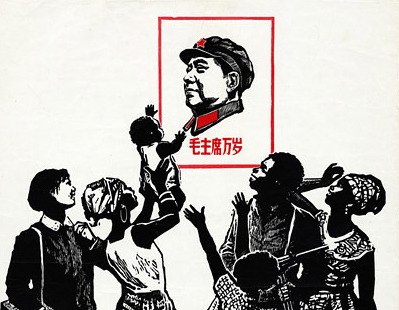Anti-blackness in Asian communities
CW racism, anti-blackness, blackface.
In light of racist media on China's Spring Gala TV show: a list of resources about anti-blackness in China, and in the Asian diasporas.

In China the yearly Spring Festival Gala, aka 春节联欢晚会, aka chunjie lianhuan wanhui, is a variety show produced and broadcasted by the state-run TV channel CCTV. It's watched on Lunar New Year's Eve by over 800 million people. Since its first broadcast in 1956 it has hosted a mixture of opera, pop music, comedy skits and pro-government messages.
This year a racist segment reminded us yet again that anti-blackness is an issue that needs to be addressed in all Asian communities. The segment included a non-black Chinese actress in blackface and a black actor playing a monkey. Supposedly 'celebrating' Chinese-African relations, it perpetuated racist tropes of black people while the actors exclaimed 'I love China' and the show praised the 'Chinese-built' railway in Kenya. Since the broadcast, articles criticising the segment have been removed from Chinese websites.
Whilst we condemn the actions of those who were involved in the Spring Gala, we must bear in mind that this is not an individual incident. Anti-blackness is structural, and has a history in the Chinese context (see e.g. Barry Sautman below). Imperialist attitudes towards Africa, encountered in the Spring Gala skit, have pervaded China since the 1960s (see propaganda posters below). Elsewhere in Chinese broadcasting, the Qiaobi laundry detergent company produced a racist advert where a black man was washed to transform into a Chinese man.
Anti-blackness is rife also in the diaspora: in 1991, Korean shopkeeper Soon Ja Du shot dead teenager Latasha Harlins over a bottle of orange juice in Los Angeles. Du was not sentenced to prison, but probation, community service and a small fine, an injustice rarely discussed in Asian communities. More recently, we see this indifference to black lives reflected in the campaign supporting NYPD officer Peter Liang in the shooting of Akai Gurley. (For more on this, as well as the incident involving United Airlines and David Dao, see below)
As facilitators of a platform for East and Southeast Asian people, we would like our readers and contributors to engage in discussions which challenge anti-blackness in our communities and across international contexts.
Here are resources we gathered on the topic:
There is no quick-and-easy microwaveable version of unlearning anti-Blackness. It is a lifelong, necessary commitment.
...ignorance cannot be a defence to the recreation of racial stereotypes.
...the overarching narrative may seem rather familiar. Ultimately China becomes the saviour of the African, and the African becomes reliant on and almost indebted to China.
不少声称“这不是种族歧视”的中国人,其实是认同种族歧视的。一方面,他们不平于自己的民族被白人社会歧视,另一方面,他们却也歧视其他种族,如非洲人、印度人。他们在看见中国人在国外地铁被打、奥斯卡歧视亚洲人的时候,往往非常愤怒并不远万里翻墙到脸书上骂脏话。
[Many Chinese who claim that "this is not racial discrimination" are actually racist themselves. On the one hand, they are aggrieved when their own ethnic groups are discriminated against by white society. On the other hand, they discriminate against other ethnic groups, such as Africans and Indians. When [online commenters] saw that Chinese people were suffering physical attacks on overseas subways, and the Oscars were discriminating against Asians, they were furious, cursing over the firewall.]
- This piece in Chinese, by Chinese reporter Sandra Severdia (@underbreath), is published on the censored website China Digital Times. Sandra critiques the hypocritical viewpoints of China's nationalist online youth.
We have to confront the fact that insofar as the model minority narrative creates (East) Asian-ness as a homogenous myth of success, where whiteness is always just a touch out of reach, such a myth also demands that we step on Black and brown people’s necks to try and get there.
-
Jun Pang on the 2017 American Airlines incident, and the problems with #ChineseLivesMatter. daikon* Issue #2
-
A blog post which is an overview of anti-African protests which have occurred in China. From the perspective of a black man who has been victim to racial abuses in Taiwan and China.
-
An academic paper which documents and examines anti-black student protests in China, 1970-1989. Barry Sautman. CW: descriptions of racist violence, racist slurs.
- Chinese-African relations in the 1960s-80s, examined through propaganda posters
Is there something you would like to share? Please contact us